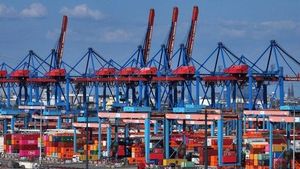The World Economic Forum (WEF) 2025 commenced on January 20, drawing nearly 3,000 participants, including business leaders, heads of states, and organizational representatives, who convene annually to confront the world's most pressing challenges.
This year's theme, "Collaboration at the Era of Intelligence," highlights the importance of collective efforts to navigate uncertainty amid geopolitical tensions, climate change, and economic disruption. Participants will engage over five key themes: reimagining growth, industries in the intelligent age, investing in people, safeguarding the planet, and rebuilding trust.
On the opening day, the forum featured remarks from influential leaders, including Ursula von der Leyen, President of the European Commission, and Ding Xuexiang, Vice Premier of China. Their speeches set the stage for discussions centered around the changing global dynamics following the inauguration of newly elected US President Donald Trump.
Trump's anticipated address via videoconference later this week is driving significant attention, especially as his prior administration had established distinctly business-friendly policies. "The mood is one of optimism, particularly among business circles, with 58% expressing confidence about the global economy’s future,” stated Børge Brende, WEF President.
Reflecting on the current sentiment among business leaders, PwC's survey indicated a notable bounce back in confidence levels. Approximately 60% of business executives globally expect economic growth over the next year, spurred by the renewed pro-business policies under Trump, which many executives believe could create favorable conditions for business expansion.
Interestingly, the gathering is witnessing the absence of some significant global leaders, including those from China, India, and various European countries. This has raised eyebrows as discussions about global unity become more pertinent than ever.
Among those attending, President of Ukraine Volodymyr Zelensky's participation is especially noteworthy, primarily concerning the economic assistance his country receives from the West and the various geopolitical ramifications tied to such support. “The prospect of Trump's second term concerns us greatly,” Zelensky commented, emphasizing the importance of a "just and durable peace" for Ukraine.
The gathering has turned intense focus on how each nation navigates these tumultuous times and mends relationships blurred by previous administrations' alienation approaches. Leaders are encouraged to bolster partnerships to achieve mutual goals against the backdrop of growing polarities and perceived conflicts.
With discussion slots filled with topics like "How to transition from the growth we have to the growth we need," and poignant keywords such as 'artificial intelligence' and 'sustainability,' the forum seeks to re-establish collaboration. Julie Sweet, CEO of Accenture, stated, "There's real potential for AI to help governments serve citizens more effectively. We need to embrace these technologies to solve pressing societal problems."
Other sessions will address issues such as energy geoeconomics and potential pathways toward comprehensive global cooperation on climate change. “The urgency to build trust and facilitate engagement exists now more than ever,” Brende emphasized.
The length and depth of the issues under discussion this year are matched by the high stakes involved. The WEF has evolved as not only an annual business convention but also a platform where international policy shapes and redefines global economies, perceived futures, and technological advancements.
Although optimistically leaning, some attendees pointed out potential drawbacks, such as inflation concerns and shifting political decisions. For example, only 24% of French executives surveyed felt positive about their domestic economic outlook; nonetheless, they remained hopeful about their company’s prospects.
This juxtaposition of optimism versus caution encapsulates the diverse perspectives present at Davos 2025. The expansive discord amid burgeoning economic potential manifests evidenced by varied sentiments, conversations, and aspirations seen at the event.
Throughout the week, discussions will likely address how businesses can capitalize on newfound optimism surrounding artificial intelligence, with participants eagerly dissecting innovative strategies to leverage this pivotal technology amid shrinking resources and burgeoning societal challenges.
The World Economic Forum serves as more than just the confluence of global economic discourse; it symbolizes the intertwined destinies of nation-states and conglomerates as they grapple with and jointly shape future landscapes.
Through high-profile debates, policy perspectives, and innovative solutions, Davos remains committed to addressing consumers' and businesses' rapidly changing requirements. The unquestionable impact of this forum resonates within the transitions society faces today, setting the stage for future interactions.
With notable figures pushing the narrative at Davos 2025, the call for cohesion against the backdrop of global crisis becomes the overarching theme, showcasing the necessity for dialogue amid rapidly shifting powers. Participants from various sectors are eager to respond, adapt, and shape applicable realities for their communities.
The week-long collaboration will undoubtedly be instrumental, establishing pathways toward unity, collaboration, and innovation as leaders at all levels strive to meet the challenges lying ahead.



